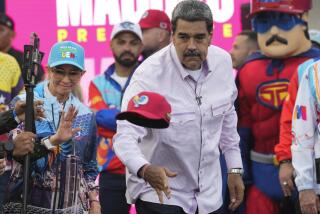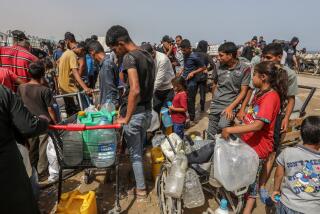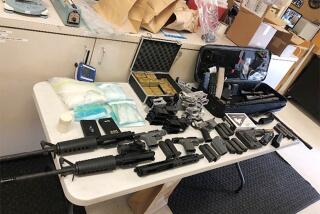Drug Trade Funding Terror Groups’ Actions, U.S. Says
WASHINGTON — The United States has determined that about one-third of foreign terrorist organizations are trafficking in narcotics on a large scale, providing authorities with “shocking” insight into how two of the nation’s most serious threats are connected, U.S. Atty. Gen. John Ashcroft said Tuesday.
“Law enforcement has been aware for some time of significant linkages between terrorism and drug trafficking. But we have not had the tools to quantify the drugs-terrorism nexus until now,” Ashcroft said in a speech before the annual conference of the Organized Crime and Drug Enforcement Task Force.
Earlier this year, Ashcroft said, he asked federal law enforcement agencies to draw up such a list, quantifying all the major trafficking groups responsible for the U.S. drug supply.
“Following extraordinary collaboration and information-sharing between agencies, this list has been developed, and what it reveals is shocking,” Ashcroft said. “Nearly one third of the organizations on the State Department’s list of foreign terrorist organizations appear also on our list of targeted U.S. drug suppliers.”
Cross-matching the lists is providing authorities with substantial leads in their ongoing global war on terrorism, Ashcroft noted, as well as helping to combat the growing problem of traffickers responsible for selling cocaine, heroin and other drugs worldwide.
Ashcroft’s remarks came as U.S. authorities, working with state and local officials and their counterparts in Mexico, announced that they had arrested more than 2,120 fugitives along the Southwestern border in recent months, as part of the largest nonterrorism dragnet in recent memory.
Ashcroft did not elaborate on which terrorist groups are suspected of being involved in drug-trafficking. Justice Department officials would not comment on what organizations are on the drug trafficking list, except to say that Al Qaeda was one of them.
“They are definitely using the drug trade to finance their operations, but it is not the major source of funding,” one Justice Department official said of Al Qaeda, which U.S. officials have said was responsible for the Sept. 11 attacks on New York and the Pentagon. “They get more money from donations and trading in gold and other precious metals. It’s a serious problem, but it’s hard to say this is where we should be putting all our resources.”
Specifically, the Justice Department official said, Al Qaeda and the Taliban regime that protected it made millions of dollars from the heroin trade in Afghanistan.
Michael Chertoff, assistant attorney general for the Justice Department’s criminal division, echoed Ashcroft’s concerns in his own remarks at the daylong conference of law enforcement officials from around the nation.
“Drug traffickers have a symbiotic relationship with terrorists,” Chertoff said.
Ashcroft said drug traffickers began engaging in terrorist activity as their organizations grew in scope and sophistication. Conversely, terrorists have expanded into drug trafficking to pay for travel and expenses of operatives and weapons, according to Justice Department officials.
The State Department, in consultation with the attorney general and the secretary of the Treasury, has designated 28 groups as foreign terrorist organizations. Those groups include Al Qaeda, Hamas, Hezbollah and other Islamic groups, as well as militant organizations in Spain, Sri Lanka, Colombia, Peru, Israel and Northern Ireland.
Authorities have long been concerned about the connections between terrorism and drug trafficking.
In South America, for instance, paramilitary organizations suspected of engaging in both terrorism and drug trafficking include the left-wing FARC, or Revolutionary Armed Forces of Colombia, and the right-wing United Self-Defense Forces of Colombia.
Also at the conference, authorities announced that many of the fugitives rounded up by teams led by U.S. marshals were “major narcotics criminals” whose operations were responsible for a significant portion of the drugs flowing across the Southwestern border.
They included the brother of celebrity murder victim Bonny Lee Bakley, an allegedly dirty Drug Enforcement Administration agent who had fled to Mexico, and an accused operative of a murderous Mexican drug cartel who drove to visit relatives in San Diego.
More to Read
Sign up for Essential California
The most important California stories and recommendations in your inbox every morning.
You may occasionally receive promotional content from the Los Angeles Times.










